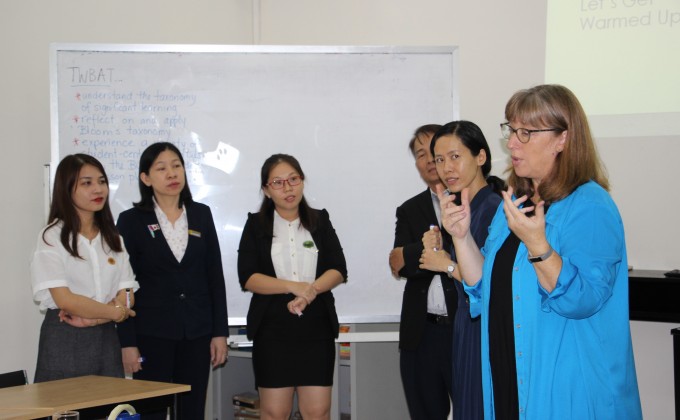
What can be accomplished in three weeks? That’s a question I asked myself when I accepted the Leave for Change assignment in Vietnam. My goal was to improve the quality of English language teaching at Saigon Hospitality and Tourism College (STHC), in order to increase the language ability of the students who are seeking careers as tour guides, chefs, and restaurant and hotel workers.
In Vietnam, the Hospitality and Tourism sectors holds enormous potential in terms of career opportunities for women. In 2017, Travel & Tourism directly and indirectly supported 4,061,000 jobs in the country and that number continues to grow. However, Vietnamese women continue to face many obstacles in their daily lives to gain access to fair and fulfilling employment. For example, women's incomes are considerably lower than men's in spite of the fact that they have closed the gap in terms of education.
The STHC is an institution where many women, both faculty members and students, are looking to diminish the wage gap and improve their living conditions through preparation for successful and meaningful careers. My main contacts and most of the English teachers at STHC were women which is the same demographic I’ve experienced globally in the English language profession. Therefore, my mandate aimed to increase the potential for female English instructors to become more confident and be effective mentors and role models for female students.
With a three-week assignment, it was necessary to hit the ground running, so jet-lag wasn’t an option. I chose to arrive in Ho Chi Minh City on Saturday, so I had a day to recover before the work began. My first weekend was also a chance to get used to the warm humid weather, the food which was mostly new to me (and delicious), and the biggest challenge of all, navigating through the endless sea of scooters. Being a motorcycle rider myself, I was in awe at the dance of the scooters which seemed to be simultaneously chaotic and choreographed.
My goal during the first week was to listen, observe, become aware of cultural norms, and create relationships. I needed the faculty to trust me and feel that I was there to help and not hinder nor critique their work. I conducted classroom observations and workshops for the English teachers. I spent time giving suggestions and modeling activities. Above all, I hoped to demonstrate my love for teaching English and for making the classroom a dynamic space for learning. Learning more English is not just a nice idea but may make the difference between a great job and a mediocre one to the 2,000 students who take the compulsory English courses. This is particularly significant to female students who may find themselves in lower paid jobs behind the scenes rather than better paying frontline jobs that require English proficiency.
During my time in Vietnam, I was impressed with the professionalism of the staff and faculty at STHC. I was also impressed by the attitudes and energy of the students. Students volunteered to accompany me on sightseeing and shopping excursions and many took the opportunity to connect every day to practice their English.
In the short time I was at STHC, I feel that I made meaningful professional connections that will continue after the project is over. We truly created a “community of practice” that will continue through an online platform and through a collaborative research project that will determine the scope of the impact on teaching practice as a result of the activities undertaken during my assignment.
So much of Vietnam was completely new to me, the sights, sounds, smells, and tastes; however, the commitment and passion of the educators I worked with made me feel that we share a culture: the culture of our classrooms and the connections to our students that transcends borders. I am grateful that I could share my education and 28 years of teaching experience with international colleagues, and in a small way add to the sustainable development of Vietnam through economic opportunities in tourism.